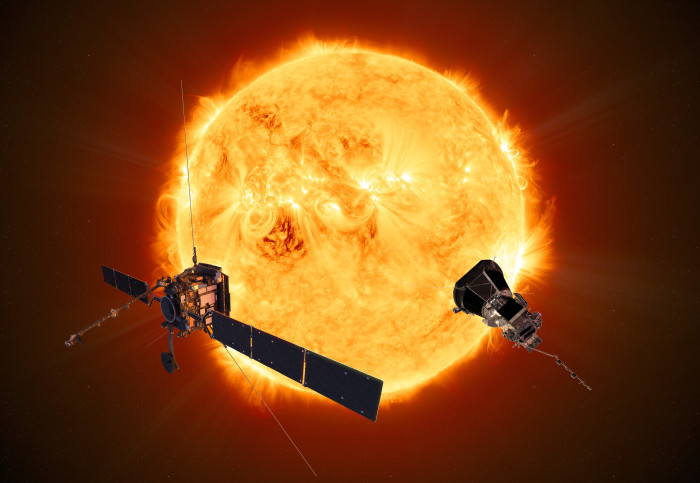Awards, fellowships and the shape of physics: News from the College

Solar Orbiter (L) and Parker Solar probe (R)
Here’s a batch of fresh news and announcements from across Imperial.
From prestigious fellowships and awards, to a new framework to determine shapes and patterns in physics data, here is some quick-read news from across the College.
Award for new cancer drug
 A team of Imperial researchers have been awarded the Royal Society of Chemistry’s Malcolm Campbell Memorial Prize 2023 for the discovery and early development of a new breast cancer drug – samuraciclib.
A team of Imperial researchers have been awarded the Royal Society of Chemistry’s Malcolm Campbell Memorial Prize 2023 for the discovery and early development of a new breast cancer drug – samuraciclib.
The drug was developed following work that identified an enzyme called CDK7 to be a major cause of resistance to breast cancer treatment. With funding from the EPSRC and Cancer Research UK, researchers from the College’s Departments of Chemistry and Surgery & Cancer, including Professor Simak Ali, Professor Anthony Barrett, Professor Charles Coombes, and Professor Matthew Fuchter, worked on producing a compound to inhibit CDK7 which could be taken in tablet form.
The drug (samuraciclib), which was developed with Carrick Therapeutics, has demonstrated clinical efficacy in phase I trials, which have resulted in US Food and Drug Administration fast-track designation for different breast cancer subtypes and progression to phase 2 clinical trials. It is hoped that the drug will improve outcomes for breast cancer patients, with research findings so far suggesting that in patients with metastatic disease, the drug, combined with hormonal treatment, can lead to very long remissions.
"We are delighted to have this recognition for the work to develop samuraciclib - an inhibitor of transcription fast-tracked by the FDA to treat patients with resistant breast cancers," said the researchers.
The prize will be awarded at the 2023 22nd Cambridge Medicinal Chemistry Symposium in September.
Ernest Rutherford fellowship
 Dr Luca Franci, from the Department of Physics, has been awarded one of ten Ernest Rutherford Fellowships from the Science and Technology Facilities Council (STFC). The fellowship will enable recipients to establish new independent research programmes, which will hone their leadership abilities and give them the opportunity to conduct cutting-edge science.
Dr Luca Franci, from the Department of Physics, has been awarded one of ten Ernest Rutherford Fellowships from the Science and Technology Facilities Council (STFC). The fellowship will enable recipients to establish new independent research programmes, which will hone their leadership abilities and give them the opportunity to conduct cutting-edge science.
Dr Franci researches the solar wind – the flow of particles blowing away from the Sun and throughout the solar system in an area known as the heliosphere. He will work with powerful supercomputer simulations and data from ESA’s Solar Orbiter and NASA’s Parker Solar Probe missions, which aim to provide unparalleled measurements of the environment closer to the sun than ever before.
Dr Franci will address two crucial and long-standing questions on the heliosphere: ‘how are particles energised and accelerated in the heliosphere?’ and ‘how do energetic particles travel through the heliosphere?’
The goal of the research is to improve our understanding of the processes behind the particle dynamics in the heliosphere and that are at the basis of space weather, which can affect astronauts, satellites, and power grids. This will allow for more accurate forecasts as well as to determine the design and planning of future heliospheric missions.
The shape of physics
Many areas of physics today are well described by the Standard Model, but it doesn’t explain everything, including gravity. One of the most important ways to probe beyond the Standard Model is by studying the collision of high energy particles, such as at the Large Hadron Collider.
However, these experiments produce huge datasets and finding important shapes and patterns in them can be very difficult. Physicists have built some customised search tools for such datasets over the last decade but have lacked a clear unifying framework connecting or rigorously describing them.
In a recent work, Akshunna S. Dogra (President's Scholar at Imperial), along with Rikab Gambhir (MIT) and other researchers from the IAIFI universities have proposed a joint unified framework, SHAPER, to efficiently search for shape observables in large physics datasets. Shape observables quantify the general pattern traced by the trajectories of the particles resulting from collisions.
The framework combines expertise from high-energy physics, the artificial intelligence field of dictionary learning, and the mathematical discipline of optimal transport theory.
The framework is open for people to use – inventive examples so far include the IAIFI recreating their logo and Twitter physicist @FinitePhysicist’s whimsical approach.
–
Want to be kept up to date on news at Imperial?
Sign up for our free quick-read daily e-newsletter, Imperial Today.
Article text (excluding photos or graphics) © Imperial College London.
Photos and graphics subject to third party copyright used with permission or © Imperial College London.
Reporter
Hayley Dunning
Communications Division
Ellie Cawthera
Communications Division